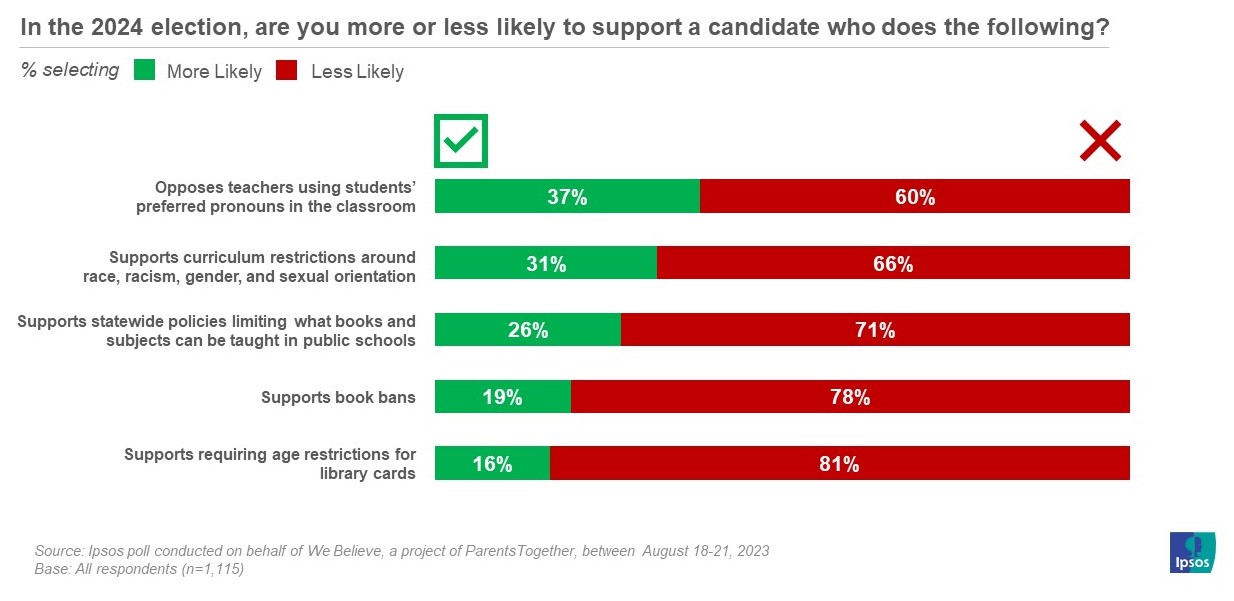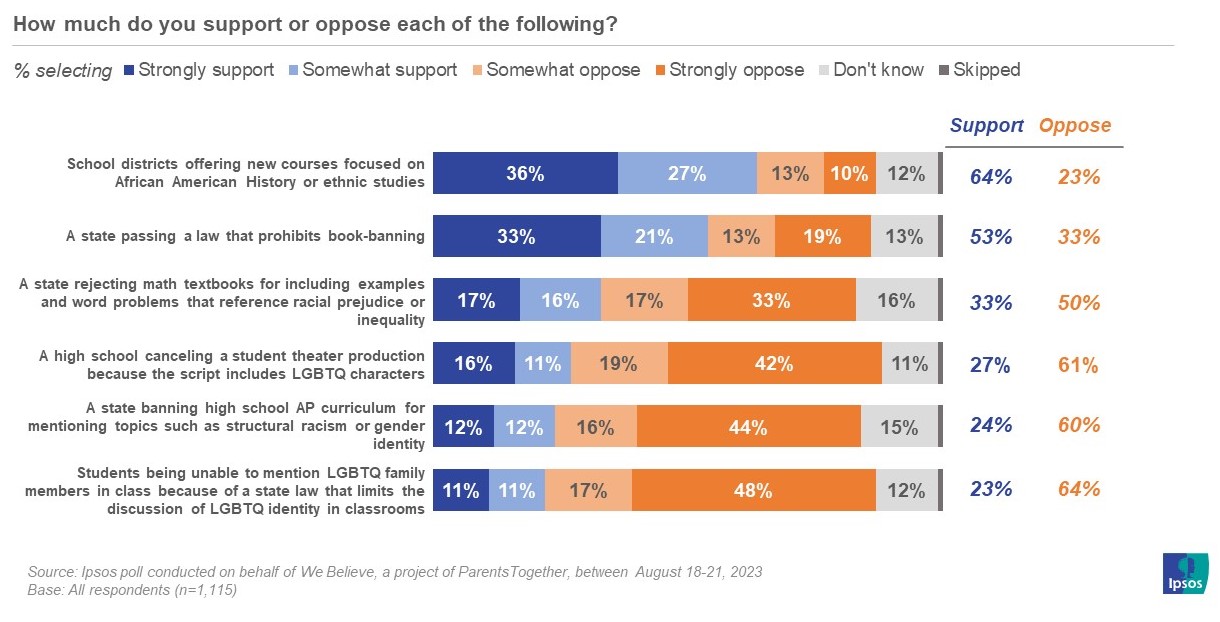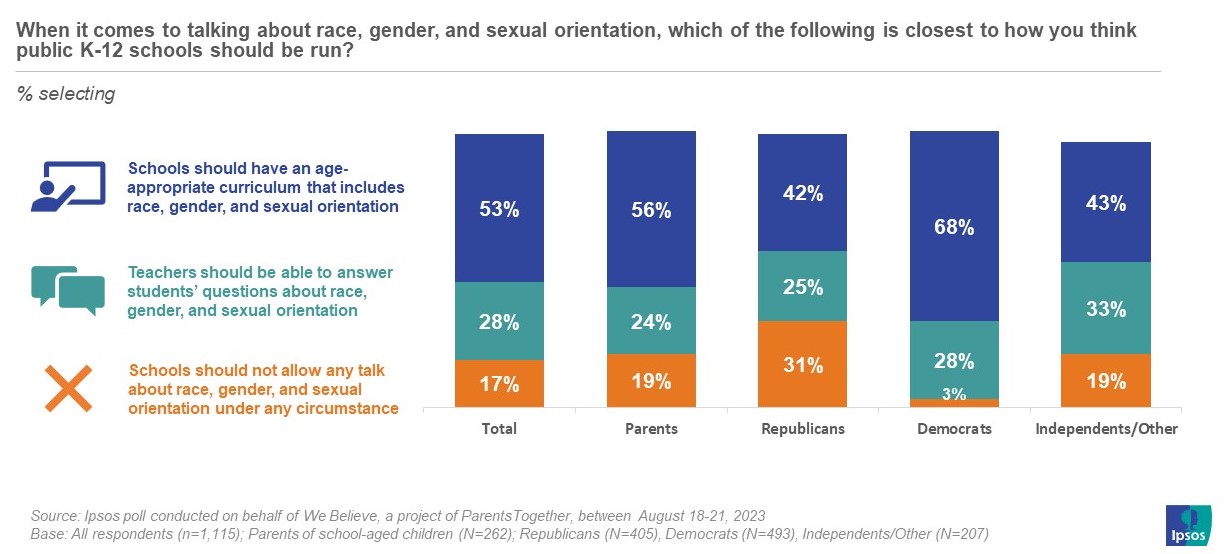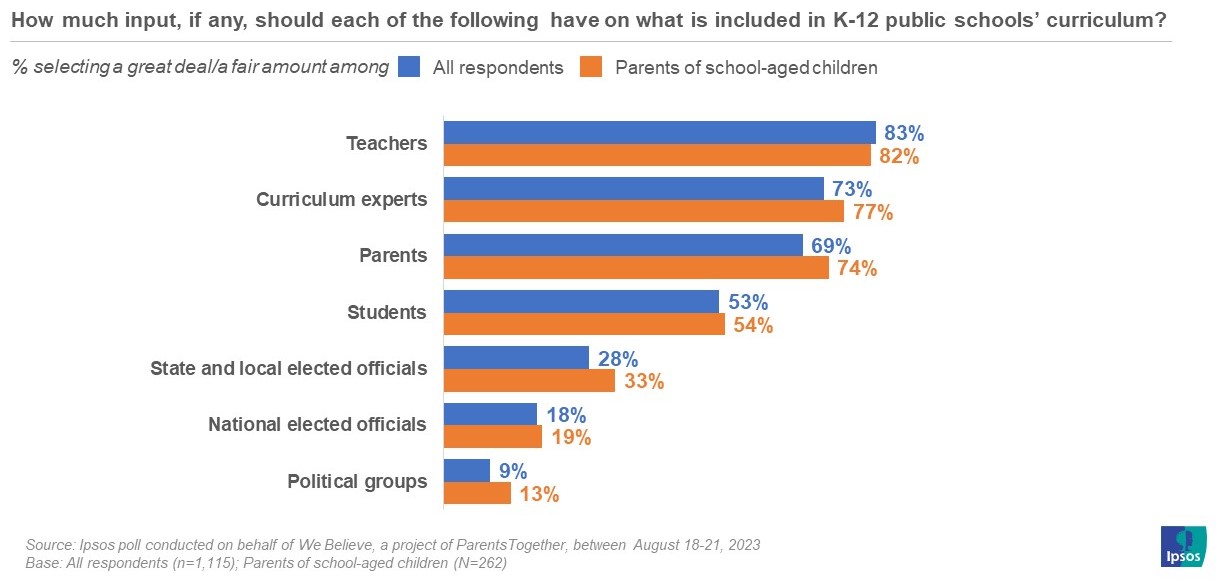Most Americans say they are less likely to support a candidate who stands for curriculum restrictions or book bans in 2024
Washington, DC, October 2, 2023 — A new Ipsos poll for We Believe, a project of ParentsTogether, finds that most Americans, including parents of school-aged children, oppose restricting what books and curriculum are taught in K-12 public schools. Instead, an overwhelming majority say teachers should at least be able to answer students’ questions on race, gender, and sexual orientation. About half say there should be an age-appropriate curriculum on those topics. Additionally, four in five Americans say schools should teach students about cultures, identities, or perspectives that may be different from their own. When considering who should have input on what is taught, most Americans say teachers should have a great deal or a fair amount of input, followed by curriculum experts, parents, and students. Few say elected officials or political groups should have a great deal or a fair amount of input. That said, most Americans say they would be less likely to support a candidate in 2024 if they support book bans, curriculum restrictions, or age requirements for library cards.
While Democrats are more likely than Republicans to oppose book bans and curriculum restrictions, most Republicans still say they would be less likely to support a candidate in 2024 who is in favor of book bans or adding age requirements for library cards. More than half of Republicans also say teachers should at least be able to answer students’ questions about race, gender, and sexual orientation.
For more information about this study, please click here.
Note: For the most part, parents of school-aged children have similar attitudes to Americans overall about what is taught in K-12 public schools. Where their perspectives differ, though, we often call it out below.
Detailed Findings
1. Ahead of the 2024 election, most Americans—as well as parents of school-aged children—say they would be less likely to support a candidate who is in favor of restricting classroom curriculum, implementing book bans, or requiring age restrictions for library cards.
- About four in five say they would be less likely to support a candidate who supports book bans (78%) or requiring age restrictions for library cards (81%).
- Roughly seven in ten say they would be less likely to support a candidate who supports statewide policies limiting what can be taught in public schools (71%) or supports curriculum restrictions around race, gender, and sexual orientation (66%).
- Although most parents of school-aged children say they would be less likely to support a candidate in favor of curriculum restrictions around racism, gender, and sexual orientation, they are less likely to say so than Americans who are not parents of school-aged children (59% vs. 69%, respectively).
- Democrats and independents are more likely than Republicans to say they would be less likely to support a candidate in 2024 if they took any of the stances asked about. However, a majority of Republicans still say they would be less likely to support a candidate in favor of requiring age restrictions for library cards (70%) or in favor of book bans (62%).

2. When prompted with real-life scenarios of policies or actions around book bans or curriculum restrictions, most Americans oppose restrictions to what students learn, discuss, or participate in at school. Instead, over half say they support a state passing a law that prohibits book bans.
- Sixty-four percent say they oppose students being unable to mention LGBTQ family members in class because of a state law that limits the discussion of LGBTQ identity in classrooms.
- About three in five either say they oppose a state banning high school AP curriculum that mentions topics such as structural racism or gender identity (60%) or say they oppose a high school canceling a student theater production because the script includes LGBTQ characters (61%).
- A bare majority (50%) say they oppose a state rejecting math textbooks for including examples and word problems that reference racial prejudice or inequality.
- Fifty-three percent of Americans say they support a state passing a law that prohibits book bans. A majority of Democrats (63%) and a plurality of independents (46%) say they support ending book bans, but Republicans are more divided, with 47% in support of ending book bans and 41% in opposition to ending book bans.

3. Instead of limiting classroom discussions or content, Americans largely want teachers to at least be able to answer questions about race, gender, and sexual orientation in the classroom. Further, they want students to be exposed to things they aren’t learning about at home.
- Most Americans (81%) say teachers should at least be able to answer students’ questions about race, gender, and sexual orientation. This majority exists across party lines, although Democrats (96%) are more likely to say so than independents (76%) or Republicans (67%).
- More specifically, about half of Americans (53%) say schools should have an age-appropriate curriculum that includes race, gender, and sexual orientation. Most Democrats (68%) agree with this, while a plurality of Republicans (42%) and independents (43%) do, too.
- Four in five Americans say schools should teach about cultures, identities, or perspectives that may be different from what students learn at home. A majority of Americans agree with this, regardless of party affiliation or parental status.
- Sixty-four percent say they support school districts offering new courses focused on African American History or ethnicity studies. Most Democrats and independents say they support this (83% and 56%, respectively), but Republicans are more divided on the issue (46% support, 40% oppose).

4. A supermajority of Americans says teachers, curriculum experts, or parents should have a great deal or a fair amount of input on K-12 public school curriculum. Few say the same about elected officials or political groups.
- Most Americans (83%) say teachers should have a great deal or a fair amount of input in what is included in K-12 public schools’ curriculum, followed by curriculum experts (73%), parents (69%), and students (53%).
- A supermajority of Democrats, independents, and Republicans alike say teachers should have a great deal or a fair amount of input on K-12 public schools’ curriculum (90%, 74%, and 80%, respectively). Nevertheless, Republicans and independents are more likely than Democrats to say so about parents (85% and 67% vs. 57%, respectively).
- Rather than one individual parent influencing what books or materials can be removed from the classroom, 91% of Americans say K-12 schools should consider feedback from multiple sources when deciding what books or materials are taught in the classroom. A majority, regardless of party affiliation, agree with this sentiment.
- Few say that elected officials—whether at the national (18%) or state/local levels (28%)—should have a great deal or a fair amount of input on what is included in K-12 public schools’ curriculum. Even fewer (9%) say so about political groups.
- Republicans are more likely than Democrats to say state and local elected officials should have a great deal or a fair amount input in K-12 public school curriculum, but a majority of Republicans (60%) still say that they should have no input or not very much input at all.

These are the findings of an Ipsos poll conducted between August 18-21, 2023, on behalf of We Believe, a project of ParentsTogether. For this survey, a sample of 1,115 adults age 18+—with an oversample of parents of school-aged children—from the continental U.S., Alaska, and Hawaii was interviewed online in English. The poll has a margin of sampling error of 3.2 percentage points for all respondents.
About the Study
These are some of the findings of an Ipsos poll conducted between August 18-21, 2023, on behalf of We Believe, a project of ParentsTogether. For this survey, a sample of 1,115 adults age 18+ from the continental U.S., Alaska, and Hawaii was interviewed online in English. The sample includes 262 parents of school-aged children, 405 Republicans, 493 Democrats, and 207 independents/other. The 262 parents of school-aged children in the sample includes an oversample of N=75 parents of school-aged children.
The survey was conducted using KnowledgePanel®, the largest and most well-established online probability-based panel that is representative of the adult US population. Our recruitment process employs a scientifically developed addressed-based sampling methodology using the latest Delivery Sequence File of the USPS – a database with full coverage of all delivery points in the US. Households invited to join the panel are randomly selected from all available households in the U.S. Persons in the sampled households are invited to join and participate in the panel. Those selected who do not already have internet access are provided a tablet and internet connection at no cost to the panel member. Those who join the panel and who are selected to participate in a survey are sent a unique password-protected log-in used to complete surveys online. As a result of our recruitment and sampling methodologies, samples from KnowledgePanel® cover all households regardless of their phone or internet status and findings can be reported with a margin of sampling error and projected to the general population.
The data for the total sample were weighted to adjust for gender by age, race/ethnicity, education, Census region, metropolitan status, household income, and political party affiliation. The demographic benchmarks came from the 2022 March Supplement of the Current Population Survey (CPS). Party ID benchmarks are from recent ABC News/Washington Post telephone polls. The weighting categories were as follows:
- Gender (Male, Female) by Age (18–29, 30–44, 45-59 and 60+)
- Race/Hispanic Ethnicity (White Non-Hispanic, Black Non-Hispanic, Other, Non-Hispanic, Hispanic, 2+ Races, Non-Hispanic)
- Education (Less than High School, High School, Some College, Bachelor or higher)
- Census Region (Northeast, Midwest, South, West)
- Metropolitan status (Metro, non-Metro)
- Household Income (Under $25,000, $25,000-$49,999, $50,000-$74,999, $75,000-$99,999, $100,000-$149,999, $150,000+)
- Party ID (Democrat, Republican, Independent, Something else)
The margin of sampling error is plus or minus 3.2 percentage points at the 95% confidence level, for results based on the entire sample of adults. The margin of sampling error takes into account the design effect, which was 1.15. The poll also has a margin of error of plus or minus 6.5 percentage points for parents of school-aged children, plus or minus 5.2 percentage points for Republicans, plus or minus 4.5 percentage points for Democrats, and plus or minus 7.4 percentage points for independents/other. The margin of sampling error is higher and varies for results based on sub-samples. In our reporting of the findings, percentage points are rounded off to the nearest whole number. As a result, percentages in a given table column may total slightly higher or lower than 100%. In questions that permit multiple responses, columns may total substantially more than 100%, depending on the number of different responses offered by each respondent.
The trended data in this topline is from an Ipsos poll conducted between August 19-22, 2022, on behalf of We Believe, a project of ParentsTogether. For this trended data survey, a sample of 1,301 adults age 18+ from the continental U.S., Alaska, and Hawaii was interviewed online in English. The margin of sampling error was plus or minus 3.0 percentage points at the 95% confidence level, for results based on the entire sample of adults. The margin of sampling error took into account the design effect, which was 1.2. For more information about the August 2022 study, please click here.
For more information on this news release, please contact:
Chris Jackson
Senior Vice President, US
Public Affairs
+1 202 420-2025
About Ipsos
Ipsos is one of the largest market research and polling companies globally, operating in 90 markets and employing over 18,000 people.
Our passionately curious research professionals, analysts and scientists have built unique multi-specialist capabilities that provide true understanding and powerful insights into the actions, opinions and motivations of citizens, consumers, patients, customers or employees. Our 75 solutions are based on primary data from our surveys, social media monitoring, and qualitative or observational techniques.
Our tagline "Game Changers" sums up our ambition to help our 5,000 customers move confidently through a rapidly changing world.
Founded in France in 1975, Ipsos has been listed on the Euronext Paris since July 1, 1999. The company is part of the SBF 120 and Mid-60 indices and is eligible for the Deferred Settlement Service (SRD).ISIN code FR0000073298, Reuters ISOS.PA, Bloomberg IPS:FP www.ipsos.com



